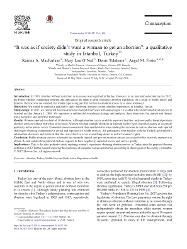| dc.contributor.author | MacFarlane, Katrina A. | |
| dc.contributor.author | O'Neil, Mary Lou | |
| dc.contributor.author | Tekdemir, Deniz | |
| dc.contributor.author | Foster, Angel M. | |
| dc.date.accessioned | 2019-06-27T08:01:24Z | |
| dc.date.available | 2019-06-27T08:01:24Z | |
| dc.date.issued | 2017 | |
| dc.identifier.issn | 0010-7824 | en_US |
| dc.identifier.issn | 1879-0518 | en_US |
| dc.identifier.uri | https://hdl.handle.net/20.500.12469/369 | |
| dc.identifier.uri | https://doi.org/10.1016/j.contraception.2016.07.190 | |
| dc.description.abstract | Introduction: In 1983 abortion without restriction as to reason was legalized in Turkey. However at an international conference in 2012 the Prime Minister condemned abortion and announced his intent to draft restrictive abortion legislation. As a result of public outcry and protests the law was not enacted but media reports suggest that barriers to abortion access have since worsened. Objectives: We aimed to conduct a qualitative study exploring women's recent abortion experiences in Istanbul Turkey. Study design: In 2015 we conducted 14 semi-structured in-depth interviews with women aged 18 or older who had obtained abortion care in Istanbul on/after January 1 2009. We employed a multimodal recruitment strategy and analyzed these interviews for content and themes using deductive and inductive techniques. Results: Women reported on a total of 19 abortions. Although abortion care is available in private facilities only one public hospital provides abortion services without restriction as to reason. Women who had multiple abortions in different facility types described quality of care more positively in the private sector. Unmarried women considered their marital status when making the decision to seek an abortion and reported challenges obtaining comprehensive sexual and reproductive health services. All participants were familiar with the Turkish government's antiabortion discourse and believed that this was reflective of an overarching desire to restrict women's rights. Conclusion: Public abortion services in Istanbul are currently limited and private abortion services are accessible but relatively expensive to obtain. Recent antiabortion political rhetoric appears to have negatively impacted access and service quality. Implications: This is the first qualitative study exploring women's experiences obtaining abortion services in Turkey since the proposed abortion restriction in 2012. Further research exploring the experiences of unmarried women and abortion accessibility in other regions of the country is warranted. (C) 2017 Elsevier Inc. All rights reserved. | en_US] |
| dc.language.iso | eng | en_US |
| dc.publisher | Elsevier Science Inc | en_US |
| dc.rights | info:eu-repo/semantics/openAccess | en_US |
| dc.subject | Abortion | en_US |
| dc.subject | Turkey | en_US |
| dc.subject | Middle East and North Africa | en_US |
| dc.subject | Reproductive health | en_US |
| dc.title | "It was as if society didn't want a woman to get an abortion": a qualitative study in Istanbul Turkey | en_US |
| dc.type | article | en_US |
| dc.identifier.startpage | 154 | en_US |
| dc.identifier.endpage | 160 | |
| dc.relation.journal | Contraception | en_US |
| dc.identifier.issue | 2 | |
| dc.identifier.volume | 95 | en_US |
| dc.department | Fakülteler, İktisadi, İdari ve Sosyal Bilimler Fakültesi, Siyaset Bilimi ve Kamu Yönetimi Bölümü | en_US |
| dc.identifier.wos | WOS:000392895300006 | en_US |
| dc.identifier.doi | 10.1016/j.contraception.2016.07.190 | en_US |
| dc.identifier.scopus | 2-s2.0-84982171368 | en_US |
| dc.institutionauthor | O'Neil, Mary Lou | en_US |
| dc.relation.publicationcategory | Makale - Uluslararası Hakemli Dergi - Kurum Öğretim Elemanı | en_US |
| dc.identifier.pmid | 27477064 | en_US |
















